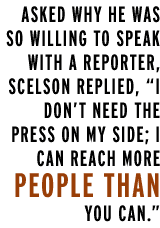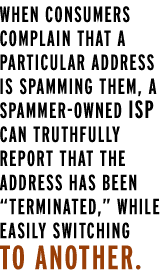| |||||||||

Inside the spammer's world
 Recent court decisions upholding laws against unsolicited e-mails will increasingly focus attention on a few individuals who send out the majority of such unwanted advertising messages. Recent court decisions upholding laws against unsolicited e-mails will increasingly focus attention on a few individuals who send out the majority of such unwanted advertising messages.
Some bulk e-mailers, also known as spammers, have gone so far as founding their own Internet service providers (ISPs) to make themselves less vulnerable to interruption of service. This makes stopping spam a kind of cat-and-mouse game. Spammers now reserve blocks of hundreds of IP addresses. When consumers complain that a particular address is spamming them, a spammer-owned ISP can truthfully report that the address has been "terminated," while easily switching to another. Spam fighters, in turn, track down the telecommunications company that provides "backbone" service to the entire address block. Telecom officials can sometimes be jawboned into shutting off the flow. According to records kept by spam-monitoring organizations such as the Spamhaus Project and BoycottSpam.org, one of the largest e-mailers is Alan M. Ralsky of West Bloomfield, Mich. One spam hunter named Frederick, who declined to be identified by his last name, provided examples of numerous e-mail messages that traced back to IP addresses registered by Ralsky. These messages promoted typical spam fodder: "free cash grants," questionable diet pills, and the like. According to state of Illinois records, Ralsky was convicted in 1994 of falsifying documents to defraud two banks in Michigan and Ohio, a felony. He was ordered to pay over $74,000 in restitution.
Prior to those convictions, Ralsky in 1992 was sentenced to 50 days in jail and ordered to pay restitution of $120,000 after "failing to deliver a contract" involving unregistered securities. In a brief telephone interview, Ralsky denied that he is involved with e-mail marketing. He says he solely operates RxPoint, a Web site that markets prescription drug benefit programs. This Web site might be of interest to Illinois officials. Ralsky's site is registered to the same address in Illinois where his license to sell insurance was revoked by the state in 1996. Ralsky's role in sending unsolicited e-mails is confirmed by a more well-known spammer, Ronald Scelson. Scelson is associated with an ISP in Louisiana called Cajunnet. His ISP confirmed last year that it held a so-called pink contract allowing mass quantities of unsolicited e-mails to be sent through PSINet, a telecom company. In an interview, Scelson proudly asserted that he and Ralsky are some of the biggest spammers. "I'm the largest one, followed by Empire Towers and Ralsky," he said. "We're the three top largest mailing companies." Scelson considers himself a legitimate e-mail marketer and speaks with scorn of spammers who covertly "relay" their messages, remotely using the servers of others. His company leases several high-capacity Internet lines, known in the business as DS3s. "We've even considered creating our own backbone," thereby eliminating any reliance on telecoms, he says. Scelson currently sends out over 18 million e-mails a day but "my maximum capacity is 32 (million) to 34 million," he says. By analyzing the technical strengths and weaknesses of various spam filters and constantly changing his own techniques, he does his best to stay ahead of efforts by other ISPs to intercept his e-mails. Scelson says his database includes 142 million e-mail addresses. Asked why he was so willing to speak with a reporter, Scelson replied, "I don't need the press on my side; I can reach more people than you can." He may have a point there. In a recent month, about 25 million individuals visited all of CNET's interrelated sites, which together rank among the Web's top 10 destinations, according to Jupiter Media Metrix. "With 142 million valid addresses, I can do this whole database in five days," Scelson says. Next week: A new, free service that can stop spam from reaching your mailbox. Brian Livingston's Wired Watchdog column appears at CNET News.com every Friday. Do you know of a problem affecting consumers? Send info to tips@BrianLivingston.com. He'll send you a book of high-tech secrets free if you're the first to submit a tip he prints. about the writer |
|
|||||||||||||||||||||||
|
Send us news tips | Contact Us | Corrections | Privacy Policy |
|

